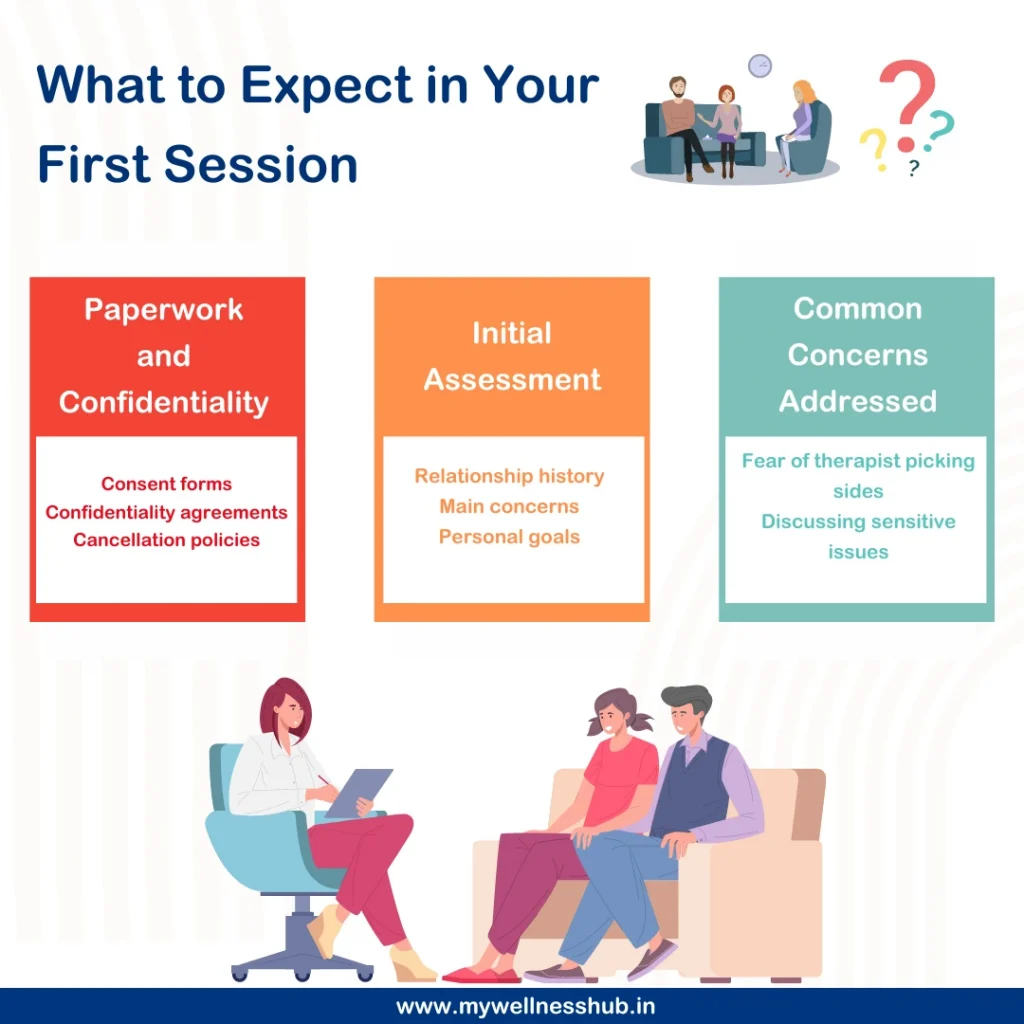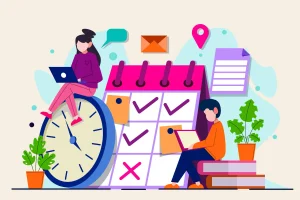Ready for Your Marriage Counseling? Here’s How to Schedule It
By Prapoorna M
Last Updated: June 11, 2024
Marriage counseling can be a vital step in nurturing and strengthening your relationship. Whether you’re facing ongoing challenges or simply want to improve your connection with your partner, counseling offers a safe space to address your issues with the guidance of a professional.
Recognizing the need for marriage counseling is a significant milestone. It shows that you and your partner are ready to invest in your relationship and work towards a happier, healthier future together. Understanding how to take the first step—scheduling your initial session—can help ease any apprehensions you might have.
Understanding the Need for Marriage Counseling
Marriage counseling can be incredibly beneficial for couples at any stage of their relationship. Understanding when to seek help is crucial for maintaining a healthy and happy partnership. Here are some common signs that indicate the need for marriage counseling:
1. Persistent Communication Issues
- If you and your partner frequently misunderstand each other or avoid difficult conversations, it might be time to seek help. Effective communication is the foundation of a strong relationship, and a counselor can teach you better ways to express your thoughts and feelings.
2. Frequent Arguments and Conflicts
- Disagreements are normal in any relationship, but if you find yourselves arguing constantly without resolution, counseling can help you address the underlying issues. A therapist can guide you in finding healthier ways to resolve conflicts and understand each other’s perspectives.
3. Emotional Distance or Feeling Disconnected
- Feeling emotionally distant or disconnected from your partner can be a sign that your relationship needs attention. Marriage counseling can help you reconnect and rebuild intimacy.
4. Infidelity or Trust Issues
- Infidelity can severely damage trust in a relationship. Counseling provides a safe space to address these issues, rebuild trust, and work through the hurt and betrayal.
5. Changes in Sexual Intimacy
- Changes in sexual intimacy can be both a cause and a symptom of relationship issues. A therapist can help you explore and resolve these concerns, improving your overall relationship satisfaction.
6. Life Transitions and Stress
- Major life changes, such as the birth of a child, job loss, or moving, can put a strain on your relationship. Counseling can help you navigate these transitions together, ensuring you stay connected and supportive of each other.
7. Considering Separation or Divorce
- If you’re contemplating separation or divorce, marriage counseling can be a last resort to address your issues and explore whether the relationship can be saved.
Common Issues Addressed in Marriage Counseling
| Common Issue | Description | Example Situations |
|---|---|---|
| Communication Problems | Difficulty expressing thoughts and feelings effectively. | Frequent misunderstandings and arguments. |
| Trust Issues | Lack of trust due to past betrayals or infidelity. | Infidelity, secrecy, and broken promises. |
| Emotional Distance | Feeling disconnected and detached from your partner. | Lack of intimacy, emotional withdrawal. |
| Conflict Resolution | Inability to resolve disagreements in a healthy manner. | Escalating arguments and unresolved conflicts. |
| Life Transitions and Stress | Adjusting to major changes such as moving, job loss, or having children. | Increased stress and changes in relationship dynamics. |
| Sexual Intimacy Concerns | Changes or issues in sexual relationships and intimacy. | Mismatched libido, lack of physical intimacy. |
Also read: How to Know If You Need Marriage Counselling? and is it Effective?
Benefits of Seeking Professional Help
Seeking professional help through marriage counseling offers numerous benefits:
1. Improved Communication
- One of the primary benefits of marriage counseling is learning how to communicate more effectively. A therapist can provide tools and techniques to help you listen and speak to each other more clearly.
2. Conflict Resolution Skills
- Counseling helps you develop better conflict resolution skills, allowing you to address disagreements in a healthy and constructive manner.
3. Enhanced Understanding and Empathy
- Through therapy, you can gain a deeper understanding of your partner’s thoughts, feelings, and needs, fostering empathy and compassion in your relationship.
4. Rebuilding Trust
- If trust has been broken, counseling can guide you through the process of rebuilding it, creating a stronger foundation for your relationship.
5. Strengthened Emotional and Physical Intimacy
- Counseling can help you reconnect emotionally and physically, enhancing intimacy and closeness in your relationship.
6. Support During Life Transitions
- A therapist can provide support and guidance as you navigate significant life changes, helping you maintain a strong partnership during challenging times.
7. Preventing Separation or Divorce
- By addressing issues early and learning how to work through them, counseling can help prevent separation or divorce, preserving your relationship.
How to Prepare for Your First Session

Preparing for your first marriage counseling session can help alleviate some of the anxiety and make the experience more productive. Here’s an overview of what to expect and how to prepare:
Overview of What to Expect in the First Session
The first session of marriage counseling is primarily about gathering information and setting the stage for future sessions. Your therapist will aim to understand the dynamics of your relationship, your individual backgrounds, and the issues you’re facing.
Paperwork and Confidentiality Agreements
At the start of your session, you’ll need to complete some paperwork. This typically includes:
- Consent Forms: These ensure that you understand the counseling process and agree to participate.
- Confidentiality Agreements: These documents outline how your information will be kept private and the circumstances under which confidentiality might be breached (e.g., in cases of harm or abuse).
- Cancellation Policies: Understanding your therapist’s policies regarding missed sessions or cancellations is crucial to avoid any misunderstandings.
Initial Assessment and Relationship History
The initial assessment helps your therapist get a comprehensive view of your relationship. Expect questions such as:
- How did you meet?
- What attracted you to each other initially?
- When did you start noticing issues in your relationship?
- What are the main concerns you hope to address in counseling?
This phase is crucial for your therapist to gather context and begin identifying patterns in your interactions.
Setting Personal Goals for Improvement
One of the key aspects of successful counseling is setting personal goals. Your therapist will guide you in identifying areas where you want to improve as a partner. This might include:
- Communicating more effectively
- Managing emotions better
- Reducing defensive reactions
- Building trust and intimacy
By setting clear goals, you create a roadmap for your progress in therapy.
Common Concerns and How to Address Them
It’s natural to have concerns about starting marriage counseling. Here are two common worries and how to address them:
Fear of Therapist Picking Sides
Many couples worry that the therapist will take sides. A good therapist, however, remains neutral and helps both partners see their own roles in the relationship dynamics. They aim to facilitate understanding and growth for both individuals.
Worry About Discussing Sensitive Issues
Discussing sensitive topics can be daunting. However, these conversations are essential for healing and growth. A skilled therapist will create a safe space for these discussions, guiding you through them in a way that promotes understanding and connection.
Tips for Making the Most of Your First Session
- Be Open and Honest: The more transparent you are, the more your therapist can help.
- Listen Actively: Pay attention to your partner’s perspective without interrupting.
- Take Notes: Jot down important points and any homework assigned.
Know more: Is Marriage Counseling Right to Go through?
Steps to Schedule Your First Marriage Counseling Session
Scheduling your first marriage counseling session may seem daunting, but following these steps can make the process straightforward and stress-free. Here’s how to get started:
Step 1: Research Potential Therapists
How to Find Qualified Marriage Counselors
- Begin by searching online for licensed marriage counselors in your area. Websites like Psychology Today and Therapy Tribe offer directories of qualified professionals.
- Ask for recommendations from friends, family, or your primary care doctor.
- Check reviews and ratings to see what others have said about their experiences.
Importance of Finding a Good Fit for Both Partners
- It’s crucial that both you and your partner feel comfortable with the therapist. Look for someone who specializes in marriage counseling and has experience with issues similar to yours.
- Schedule initial consultations with a few therapists to find the best fit. Use this time to gauge their approach and how well they understand your concerns.
Step 2: Contact the Therapist
How to Initiate Contact
- Reach out to potential therapists via phone call, email, or their online contact forms. Many therapists offer a brief initial consultation, either free or at a reduced rate.
- When contacting the therapist, be clear about your needs and what you hope to achieve through counseling.
What Information to Have Ready
- Be prepared with personal details, including your full name and contact information.
- Know your availability to discuss potential appointment times.
- Have your insurance information ready, as well as questions about fees and payment options.
Step 3: Book the Appointment
Discussing Available Times and Dates
- Once you’ve chosen a therapist, discuss your and your partner’s availability to find a convenient time for both of you.
- Ask about the typical length of sessions and how frequently they recommend meeting.
Understanding the Therapist’s Scheduling Policies and Fees
- Clarify the therapist’s policies on cancellations and rescheduling to avoid any misunderstandings later.
- Discuss the fees and whether they offer a sliding scale based on income. Ensure you understand the payment methods they accept.
Step 4: Prepare for the Session
Tips for Discussing and Setting Expectations with Your Partner
- Have an open conversation with your partner about what you both hope to get out of counseling. Setting mutual goals can help align your expectations.
- Agree on any topics you want to prioritize during your first session.
What to Bring to the Session
- Bring a notebook to jot down important points, questions, or homework assigned by the therapist.
- Prepare a list of concerns or topics you want to discuss. This ensures you cover everything important to you.
- Have any necessary paperwork or documents, such as completed intake forms or insurance details.
Explore more Talk It Out: Secrets to Strong Marriage Communication
Making the Most Out of Your First Session
Your first marriage counseling session is a critical step toward improving your relationship. Making the most out of this session can set a positive tone for the therapy process. Here’s how to do it:
Building Trust with Your Therapist
Trust is the cornerstone of any successful therapy. In your first session, take time to get to know your therapist and their approach. Remember, it’s okay to ask questions about their experience and how they plan to help you and your partner. Building this trust from the beginning helps create a safe and open environment for both of you.
Effective Communication Tips
Communication is a key component of marriage counseling. Here are some tips to ensure you communicate effectively during your sessions:
Listening Actively
- Stay Present: Focus on what your partner is saying without planning your response while they’re speaking.
- Show Understanding: Nodding or giving verbal affirmations like “I understand” can help show that you’re engaged and empathetic.
- Avoid Interruptions: Let your partner finish their thoughts before you respond. This fosters a respectful and open dialogue.
Sharing Honestly but Respectfully
- Be Open: Share your feelings honestly, but do so in a way that is respectful and non-accusatory. Use “I” statements (e.g., “I feel…” rather than “You always…”).
- Stay Calm: Discuss sensitive issues in a calm and composed manner. If emotions run high, take a moment to breathe and collect your thoughts.
- Express Needs Clearly: Be clear about what you need from your partner and the therapy process. This helps avoid misunderstandings and sets clear expectations.
Setting Realistic Goals for Therapy
Setting achievable goals is crucial for tracking progress in marriage counseling. Discuss with your therapist what you both hope to accomplish. Here are some examples of realistic goals:
- Improving Communication: Aim to enhance how you express and listen to each other.
- Rebuilding Trust: Set steps to rebuild trust if it has been broken.
- Increasing Emotional Intimacy: Work on ways to reconnect emotionally and strengthen your bond.
- Conflict Resolution: Learn and apply new strategies for resolving conflicts in a healthy manner.
After the First Session: What to Expect
Your first marriage counseling session sets the stage for your therapeutic journey. Knowing what to expect after this initial meeting can help you stay focused and committed to the process. Here’s a guide to help you navigate the next steps:
Discussing the Roadmap Provided by the Therapist
At the end of your first session, your therapist will likely provide a roadmap outlining the direction of your therapy. This plan will include:
- Short-Term Goals: Immediate areas to address, such as improving communication or reducing conflicts.
- Long-Term Goals: Broader objectives like rebuilding trust or enhancing emotional intimacy.
- Therapy Structure: How sessions will be structured, including individual versus joint sessions and the frequency of meetings.
Homework and Exercises to Work on Between Sessions
Therapy doesn’t end when the session is over. To maximize the benefits, your therapist will likely assign homework or exercises to work on between sessions. These activities are designed to reinforce what you’ve discussed and help you apply new skills in real-life situations. Examples include:
- Communication Exercises: Practice active listening and respectful sharing techniques with your partner.
- Journaling: Write down your thoughts, feelings, and any conflicts that arise. This helps you reflect on your behavior and identify patterns.
- Behavioral Tasks: Implement specific actions to improve your relationship, such as scheduling regular date nights or practicing patience during disagreements.
Evaluating the First Session’s Effectiveness
After your first session, it’s important to reflect on the experience and evaluate its effectiveness. Consider discussing the following questions with your partner:
- Did We Feel Heard?: Assess whether you both felt listened to and understood by the therapist.
- Were Our Concerns Addressed?: Determine if the therapist addressed your main concerns and provided initial insights or solutions.
- Do We Feel Comfortable?: Reflect on whether you felt comfortable and safe sharing personal information.
- Is the Roadmap Clear?: Ensure that the therapy plan makes sense and aligns with your goals.
Finding the Right Fit
Choosing the right therapist is crucial for the success of your marriage counseling journey. Here’s how to ensure you and your partner feel comfortable and supported:
Importance of Feeling Comfortable with Your Therapist
Feeling comfortable with your therapist is essential for effective therapy. A good fit means you both feel safe, respected and understood. Here’s why comfort matters:
- Openness and Honesty: When you feel at ease, you’re more likely to share openly and honestly about your thoughts and feelings, which is vital for progress.
- Trust and Rapport: Building trust with your therapist enables a deeper therapeutic relationship, fostering an environment where genuine change can occur.
- Effective Communication: A comfortable atmosphere encourages better communication, both with your therapist and between you and your partner during sessions.
What to Do If You Feel the Therapist Is Not the Right Fit
Sometimes, despite best efforts, you might find that a therapist is not the right fit for you and your partner. Here’s what to do if that happens:
1. Communicate Your Concerns
- Discuss your feelings with your therapist. Sometimes, addressing specific concerns can lead to adjustments that improve the therapeutic relationship.
2. Evaluate Specific Issues
- Identify what specifically isn’t working. Is it the therapist’s approach, communication style, or something else? Understanding the problem can help you seek a better match.
3. Don’t Be Afraid to Change
- It’s okay to seek a different therapist. Your well-being and the success of your therapy are paramount. Look for someone who better meets your needs and with whom both you and your partner feel comfortable.
4. Seek Recommendations
- Ask for recommendations from trusted sources. Friends, family, or other healthcare providers can often suggest therapists who might be a better fit.
5. Use the Initial Sessions to Assess Fit
- Treat the first few sessions as a trial period to assess compatibility. If it doesn’t feel right after a couple of sessions, it’s okay to look for another therapist.
Comparison of Therapy Approaches
| Therapy Approach | Description | Best For |
|---|---|---|
| Cognitive Behavioral Therapy (CBT) | Focuses on identifying and changing negative thought patterns to improve behavior and emotional regulation. | Addressing specific issues like anxiety and depression. |
| Emotionally Focused Therapy (EFT) | Aims to help couples understand and change emotional responses to enhance relationships and communication. | Improving emotional connection and intimacy. |
| Solution-Focused Brief Therapy (SFBT) | Concentrates on finding immediate solutions to current problems and setting goals for positive change. | Short-term therapy needs and goal-oriented outcomes. |
| Psychodynamic Therapy | Explores unconscious thoughts and feelings that influence behavior and relationships. | Deep-rooted issues and long-term therapy. |
Conclusion
Scheduling and attending your first marriage counseling session is an important step toward improving your relationship. By preparing well and knowing what to expect, you can make this process easier and more effective. Seeking help shows that you are committed to making things better and working towards a healthier, happier partnership.
Taking this step might feel scary, but it’s crucial for addressing and resolving issues that may be affecting your relationship. Don’t hesitate to reach out and make that appointment; it’s a positive move towards understanding each other better and growing together. Wellness Hub is here to support you with resources to find professional marriage counselors suited to your needs. For more information on how to schedule your first session, visit our counseling resources. Start your journey today towards a stronger bond with your partner.
Frequently Asked Questions:
1. How do I schedule my first marriage counseling session?
Scheduling your first marriage counseling session involves researching potential therapists, contacting them to discuss availability, booking the appointment, and preparing for the session. Make sure to have your personal details, availability, and insurance information ready when contacting a therapist.
2. What should I expect in the first marriage counseling session?
In the first session, you will complete some paperwork, discuss confidentiality agreements, and provide an overview of your relationship history. The therapist will assess your relationship dynamics and help you set personal goals for improvement.
3. How can I find a qualified marriage counselor?
To find a qualified marriage counselor, search online directories, ask for recommendations from friends or family, and check reviews. Ensure the therapist specializes in marriage counseling and has experience with issues similar to yours.
4. What if I don’t feel comfortable with the therapist?
If you don’t feel comfortable with the therapist, communicate your concerns. If things don’t improve, it’s okay to seek a different therapist. Finding the right fit is crucial for effective therapy.
5. What are common signs that indicate the need for marriage counseling?
Common signs include persistent communication issues, frequent arguments, emotional distance, trust issues, changes in sexual intimacy, stress from life transitions, and considering separation or divorce.
6. What are the benefits of seeking professional help through marriage counseling?
Marriage counseling can improve communication, conflict resolution, understanding and empathy, rebuild trust, strengthen emotional and physical intimacy, and support you through life transitions.
7. How should I prepare for my first marriage counseling session?
Prepare by discussing expectations with your partner, bringing a notebook for important points and questions, and having any necessary paperwork ready. Being open and honest during the session is also crucial.
8. What if sensitive issues arise during counseling?
Discussing sensitive issues is a part of the healing process. A skilled therapist will guide you through these conversations constructively, ensuring a safe and respectful environment.
9. What happens after the first marriage counseling session?
After the first session, your therapist will provide a roadmap for your therapy. You may receive homework or exercises to work on between sessions. Evaluate the session’s effectiveness and continue to communicate openly with your therapist.
10. How can Wellness Hub help with finding a marriage counselor?
Wellness Hub offers resources to help you find professional marriage counselors suited to your needs. Visit our counseling resources for more information on how to schedule your first session and make the most out of your therapy.
About the Author:
Prapoorna Mangalampalli
M.Sc., M.A., (Dual Masters in Psychology & English) – Counselor (6+ years of experience)
Prapoorna, with dual Master’s degrees in Psychology and English and over 6 years of experience, elevates human experiences through insightful counseling. She excels in online, marital, relationship, child, family, and career counseling. At Wellness Hub, she thrives in a team environment, valuing innovation, compassion, and client success.
Connect with Prapoorna to find your voice and build a brighter future.
Book your Free Consultation Today
Parent/Caregiver Info:
Client’s Details:
* Error Message









